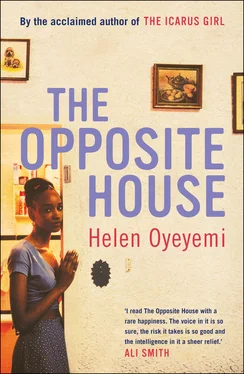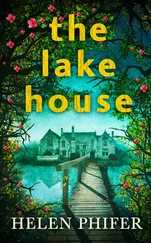Helen Oyeyemi - The Opposite House
Здесь есть возможность читать онлайн «Helen Oyeyemi - The Opposite House» весь текст электронной книги совершенно бесплатно (целиком полную версию без сокращений). В некоторых случаях можно слушать аудио, скачать через торрент в формате fb2 и присутствует краткое содержание. Год выпуска: 2008, Издательство: Bloomsbury UK, Жанр: Современная проза, на английском языке. Описание произведения, (предисловие) а так же отзывы посетителей доступны на портале библиотеки ЛибКат.
- Название:The Opposite House
- Автор:
- Издательство:Bloomsbury UK
- Жанр:
- Год:2008
- ISBN:нет данных
- Рейтинг книги:4 / 5. Голосов: 1
-
Избранное:Добавить в избранное
- Отзывы:
-
Ваша оценка:
- 80
- 1
- 2
- 3
- 4
- 5
The Opposite House: краткое содержание, описание и аннотация
Предлагаем к чтению аннотацию, описание, краткое содержание или предисловие (зависит от того, что написал сам автор книги «The Opposite House»). Если вы не нашли необходимую информацию о книге — напишите в комментариях, мы постараемся отыскать её.
The Opposite House — читать онлайн бесплатно полную книгу (весь текст) целиком
Ниже представлен текст книги, разбитый по страницам. Система сохранения места последней прочитанной страницы, позволяет с удобством читать онлайн бесплатно книгу «The Opposite House», без необходимости каждый раз заново искать на чём Вы остановились. Поставьте закладку, и сможете в любой момент перейти на страницу, на которой закончили чтение.
Интервал:
Закладка:
That’s not really a question, so I just stare at her.
‘Then tell him. Duh,’ she says.
As I let myself back into the flat Aaron shouts, ‘My mum called; she wants to have lunch with you on Saturday. .’
I scowl at the ceiling. Aaron’s mother, Rebecca, keeps saying things like, ‘Where are the go-getters? Where are the people who are going to make a difference?’
She doesn’t sound accusing, just encouraging; she wants me to look around, then look into myself and see that the go-getter is me. Under a thatch of grey-black hair, Rebecca has Aaron’s misty eyes, and she uses them to far more oppressive effect than he does. Over lunch we will not have a conversation; she will be attempting to enlist me for some cause.
In the bedroom, Aaron is kneeling by the dresser with his camcorder trained on his head. He is parting his hair with his fingers. I pull my dress up over my head, change into one of his T-shirts, hang the dress up. I refuse to ask him what he’s doing. He’s bare-chested and his jeans are slung low to reveal the top of his boxer shorts. He says sadly, ‘I’m getting old.’
I go to him then, wrap my arms around him, tuck my chin over his shoulder so that I’m peeping up into the camera as well, but he wants me to inspect his hair. Mixed in with the black are minute strands of grey. I am not certain that I know what form the fear of turning into an old man takes. In my memory Papi seems always to have been grey, but always strong, never winding down his inner speed. I don’t think anything of Aaron’s hair, but because I have to say something I tell him I think it looks distinguished, and he groans. ‘It’s the hospital.’
Aaron switches off the camcorder. He stands to show me a bowl he’s placed on a damp patch of carpet beside the mirror. Fat, sluggish drops of water fall from a discoloured part of the ceiling.
‘There’s a leak as well, and I can’t sleep, but I’ve got to get up fucking early tomorrow, and I’m getting old.’
‘And thin. Eat!’ I say, crashing onto the bed and bringing him, laughing, down with me. His ribcage is gaining definition beneath his skin, but a small pad of fat, a downscale of a kwashiorkor belly, is sticking out over the top of his waistband. His arms tighten around me, and I close my eyes and pretend to draw his face anew; I draw what is already there, and it is exactly as I would have it.
‘You smell good,’ he says in my ear. His fingers lightly trace letters on my inner arm with his thumb. I can’t tell what they spell; I’m not following their curves and lines, but the way his voice starts a sweet hum at the base of me.
I keep waking up and thinking that it is raining. I keep waking up with my fingers spread to protect my hair, but every time it is only the leak in the ceiling, dripping in a pattern intrinsic to itself, a self-orchestrated, maddening musical score for after dark. Aaron isn’t sleeping; it’s like he’s waiting to be able to drag me into his vortex. The first time I wake Aaron says, ‘When we were still living in Accra, Geoffrey’s mum told us what happened to a cousin who was living in London. I was. . I couldn’t even connect what she was telling me with what was around me right then, the way people were relaxed and warm and sat out in the street and minded each other’s business. Geoffrey’s mum kept telling us, “Londoners! They are mad, o!”
‘Her cousin Ama moved into this flat in Croydon, and everything was fine for a week or so; she got on well enough with the neighbours, settled in, made a few personal touches with the decoration — it was all fine. Then this leak started, ruining her carpets, making a cold winter wet and worse, and it went on and on and on for weeks. She talked to the council about it but the council wouldn’t come and take a look because the council are shit. She asked all her neighbours about the leak, but nobody knew what was happening —’
He stops. Why has he stopped? Checking me. He is such a neurotic storyteller; he never trusts that I am still listening. I think he works on a model of the first stories he learnt to love; Ghanaian call and response stories, tales as an eager echo thrown back and forth amongst the same people. ‘Yeah?’ I prompt him, muffled by my pillow. I am so tired I am drooling.
‘Well, then Ama noticed something. She noticed that the leaks had an extremely regular starting and stopping time. On Monday mornings, for example, the leak would dry up completely, but on Tuesday afternoons, the leak would get going at 3 p.m. or thereabouts.’
I giggle. ‘Say it again,’ I say. I love it when he says ‘thereabouts’ — he can’t avoid saying it with the grandiloquence a semi-Ghanaian accent bestows on mashed-together English vowels. Aaron refuses to indulge me.
‘So Ama had a proper look at her ceiling, and she found that the leak was coming from a perfectly round, perfectly drilled hole, quite a large hole, like the biggest setting on a Black and Decker.’
I stop laughing. ‘Oh my God,’ I say. ‘Is this a true story?’
‘It was the guy who lived directly above her, the same guy who passed on letters which had been mistakenly delivered to him, the same guy who’d smiled at her and shaken his head in confusion when she mentioned her problems with the leak. He’d drilled a hole in his floor, then sat himself down and drawn up a little timetable. Then, in consultation with that timetable, he would pour a couple of jugfuls of water down the hole. Either Ama had offended him in some obscure way, or this guy was mad, or both.
‘Geoffrey’s mum told us “If you take a hen’s egg from under her and she just looks at you and doesn’t do anything, put that egg back.” Peace and quiet is a sign that something’s wrong. Peace and quiet is like a broken response, a sign of people in pieces.’
I look at the dark, I look at the ceiling and at the bowl, the bowl that is filling, that is nearly full. I think of Miss Lassiter, shrouded face bent intently over a bare patch on her floor. I switch on my bedside lamp and hit Aaron, almost crying.
‘Why did you tell me that? What’s wrong with you? Why did you tell me that?’
Aaron laughs and restrains me with embarrassing ease; he turns off my lamp and holds me until I fall asleep again.
The second time I wake, I hear the television and the leak together. I get out of bed to empty the bowl and find that it’s already been emptied. Aaron is lolling on the sitting-room sofa, remote control in hand, eating cold plantain. He’s watching an old video; in it I am moving in with him and am instantly unnerved by the camera. On-screen I look as if I just left school; my hair is in box-braids that flip over into fuzzy buds at their ends, and I’m wearing dungarees and a red jumper. I’m hauling a suitcase behind me on wheels. When I see him I squeak, ‘Please turn that off,’ and from behind the camera he laughs.
‘You should go to sleep,’ I tell Aaron from where I stand. He doesn’t look round but keeps watching me on-screen as I go into the bathroom, followed at a shaky angle, and triumphantly slam my toothbrush into the cup on the rim of the sink that held only his.
I go and find Chabella’s fruit bucket beneath the kitchen table and pick out a papaya, turning it over in my hand, checking for ripeness, feeling the slight slippage of fruit beneath its skin and knowing that it’s time to eat it. The smell topples me in. Rind, fruit and seed mesh on my tongue, become as dense and sweet as cake. I’m not the one who wants the papaya, but I need all of it. I fall into a chair.
Aaron leans on my shoulder and reaches for the rest of the papaya in my hand, but I say, ‘Don’t.’
Pulp spills down my chin. I’m not angry, but serious, and he feels it. He backs away, exaggeratedly slow, his hands up to show he’s not going to take the fruit. He takes another papaya from the bucket and methodically prepares it with a knife, evacuating whole clusters of seeds with a single flick.
Читать дальшеИнтервал:
Закладка:
Похожие книги на «The Opposite House»
Представляем Вашему вниманию похожие книги на «The Opposite House» списком для выбора. Мы отобрали схожую по названию и смыслу литературу в надежде предоставить читателям больше вариантов отыскать новые, интересные, ещё непрочитанные произведения.
Обсуждение, отзывы о книге «The Opposite House» и просто собственные мнения читателей. Оставьте ваши комментарии, напишите, что Вы думаете о произведении, его смысле или главных героях. Укажите что конкретно понравилось, а что нет, и почему Вы так считаете.












